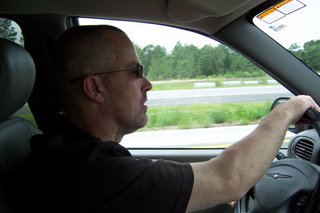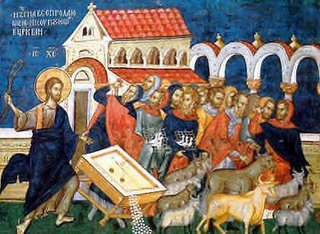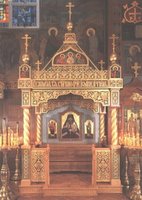 Then shall the King say unto them on His right hand, `Come, ye blessed of My Father, inherit the Kingdom prepared for you from the foundation of the world. For I hungered, and ye gave Me meat; I was thirsty, and ye gave Me drink; I was a stranger, and ye took Me in; naked, and ye clothed Me; I was sick, and ye visited Me; I was in prison, and ye came unto Me.' Then shall the righteous answer Him, saying, `Lord, when saw we Thee hungering and fed Thee, or thirsty and gave Thee drink? When saw we Thee a stranger and took Thee in, or naked and clothed Thee? Or when saw we Thee sick, or in prison, and came unto Thee?' And the King shall answer and say unto them, `Verily I say unto you, inasmuch as ye have done it unto one of the least of these My brethren, ye have done it unto Me.'
Then shall the King say unto them on His right hand, `Come, ye blessed of My Father, inherit the Kingdom prepared for you from the foundation of the world. For I hungered, and ye gave Me meat; I was thirsty, and ye gave Me drink; I was a stranger, and ye took Me in; naked, and ye clothed Me; I was sick, and ye visited Me; I was in prison, and ye came unto Me.' Then shall the righteous answer Him, saying, `Lord, when saw we Thee hungering and fed Thee, or thirsty and gave Thee drink? When saw we Thee a stranger and took Thee in, or naked and clothed Thee? Or when saw we Thee sick, or in prison, and came unto Thee?' And the King shall answer and say unto them, `Verily I say unto you, inasmuch as ye have done it unto one of the least of these My brethren, ye have done it unto Me.'Matthew 25:34 - 40
I spent the better part of two nights last week locating and arresting a variety of actual and potential felons. There were a dozen of us in several vehicles serving warrants across four counties. For me it was a chance to get out of the office and to sharpen some skills that have become dulled by inactivity. It was a surreal experience, a quick trip into the land of the living dead and the walking wounded. It was at once exhilarating and depressing, great anxiety infused with deep sadness.
I was reminded that it is far too easy to judge people, to come to believe their label, their criminal history that defines them as sex offender, drug dealer, wife beater or thief. Don’t get me wrong. I fully understand that there are vile, wicked people in the world who enjoy their depravity and will not change. With them we use due caution and take nothing for granted. But many times we fail to see the humanity, the part of all of us that is the image of God.
Often the ones we see as the bad guys are in fact victims of every conceivable form of abuse. Their physical, spiritual and emotional development arrested or at least stunted by poor diet, no connection to anything beyond their harsh physical existence and never experiencing unconditional love. As an example, one of the men we apprehended was a registered sex offender who had not fulfilled all his necessary registration requirements.
As the officers made entry through the front door, his parents arrived from somewhere and demanded to know why we were taking their son. They wanted to see the warrant. From our perspective we were doing our job as quickly and as efficiently as possible. From their perspective it was nothing short of a midnight abduction of their beloved son. They began to interfere with the process and it was quickly escalating into something ugly.
When one of the officers asked the mother to step back, the son thought we had insulted her, said we were not going to talk to his Momma that way and became violent. He was quickly restrained, put into the car and whisked away. The picture at the top was taken at that moment.
Given what I saw inside and outside the trailer (there was unbelievable squalor, dog feces throughout the residence) and how the family interacted with themselves and with us, there is a very good chance that the man we arrested had been the victim of a variety of abuses. That does not justify or explain away his actions. That does not ease the burden of the one he victimized, but it does soften the edge of our revulsion. How to offer compassion to such a man? I don’t know. Can there really be a divine spark in the soul of a sex offender? How can a man who has sex with children (and enjoys it immensely) even belong in the same creation? But does it really help anyone to treat them with rage and derision? I have to humble myself and believe that in everyone exists the potential for change. I hate the sins, but the Church asks us to love the sinner.
I say all this because there was a time in my life when many people thought I was headed for self-destruction, that I would follow in the footsteps of my father and succumb to the lure of an early death, that I would be a good for nothing drunk. In the Baptist church (of all places) I met I man who changed everything. He was not a cure-all. My life continued to spiral out of control for many, many years after I last saw him. But in him, for probably the first time in my life, I found unconditional acceptance. He saw the potential. He saw the God spark in me and he did not turn away. It was because of his influence that I even considered going to college. I was at the time a high school dropout with a GED working in a body shop painting cars. He helped me to believe that I was capable. He demonstrated Christian love. He was not afraid to love his neighbor as himself. Without him, you would not know me.
I learned that we must not see only the horrors of humanity, we must not be blind to the beauty of rebirth. Yes, we must protect ourselves, our families, our children. But our development as Christians and as humans stops if we become too battle-hardened. When we see only the spiked hair, or the filthy clothes, or the odd behavior, or the rundown home we are only seeing the effect, not the cause.
What can we do? Christ said to feed the hungry and clothe the naked. That’s a good place to start.






